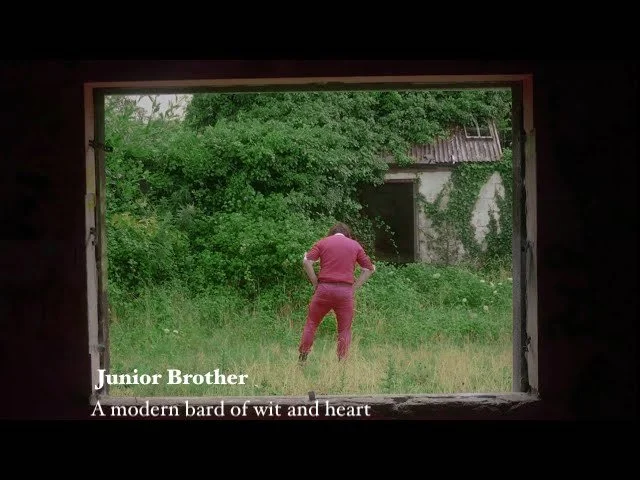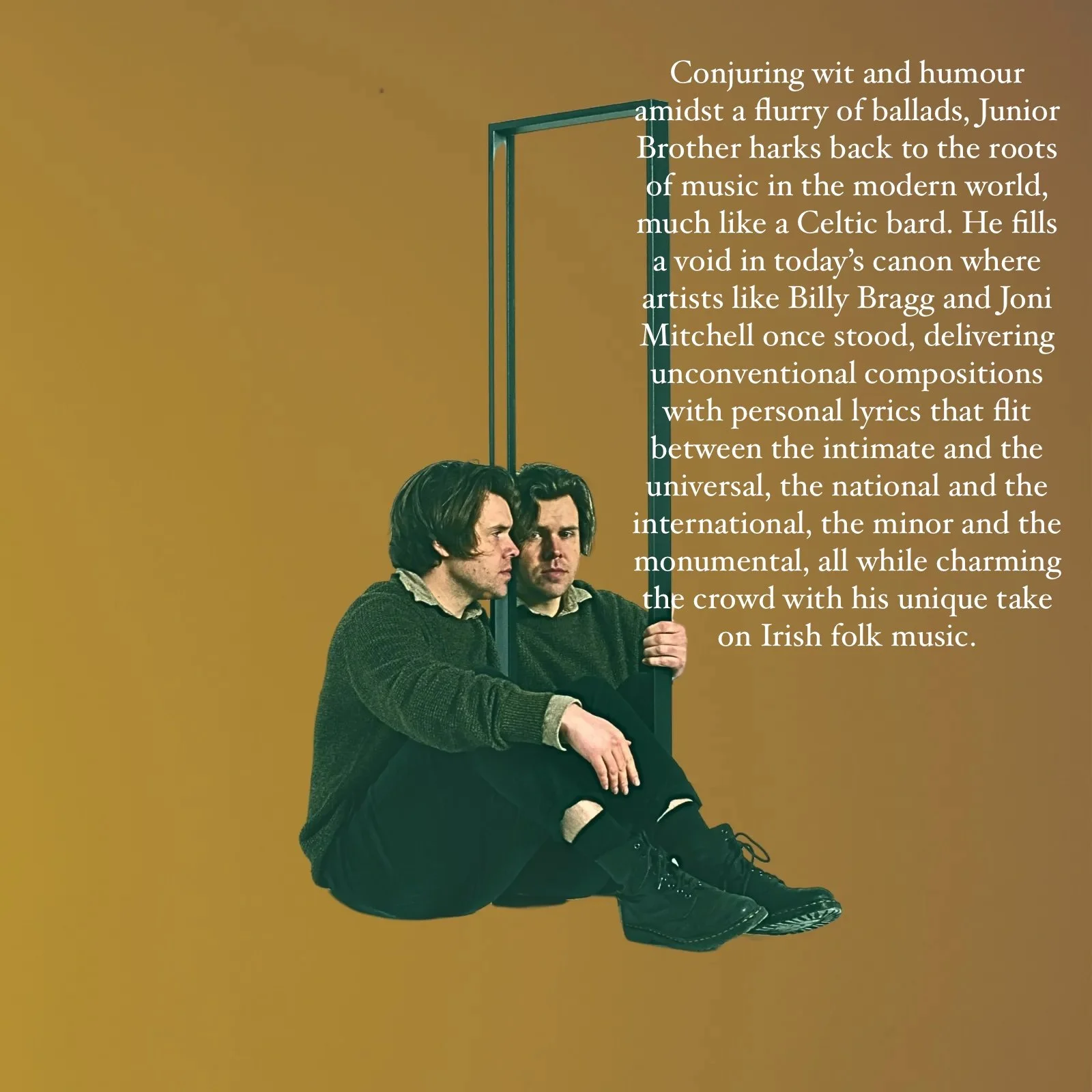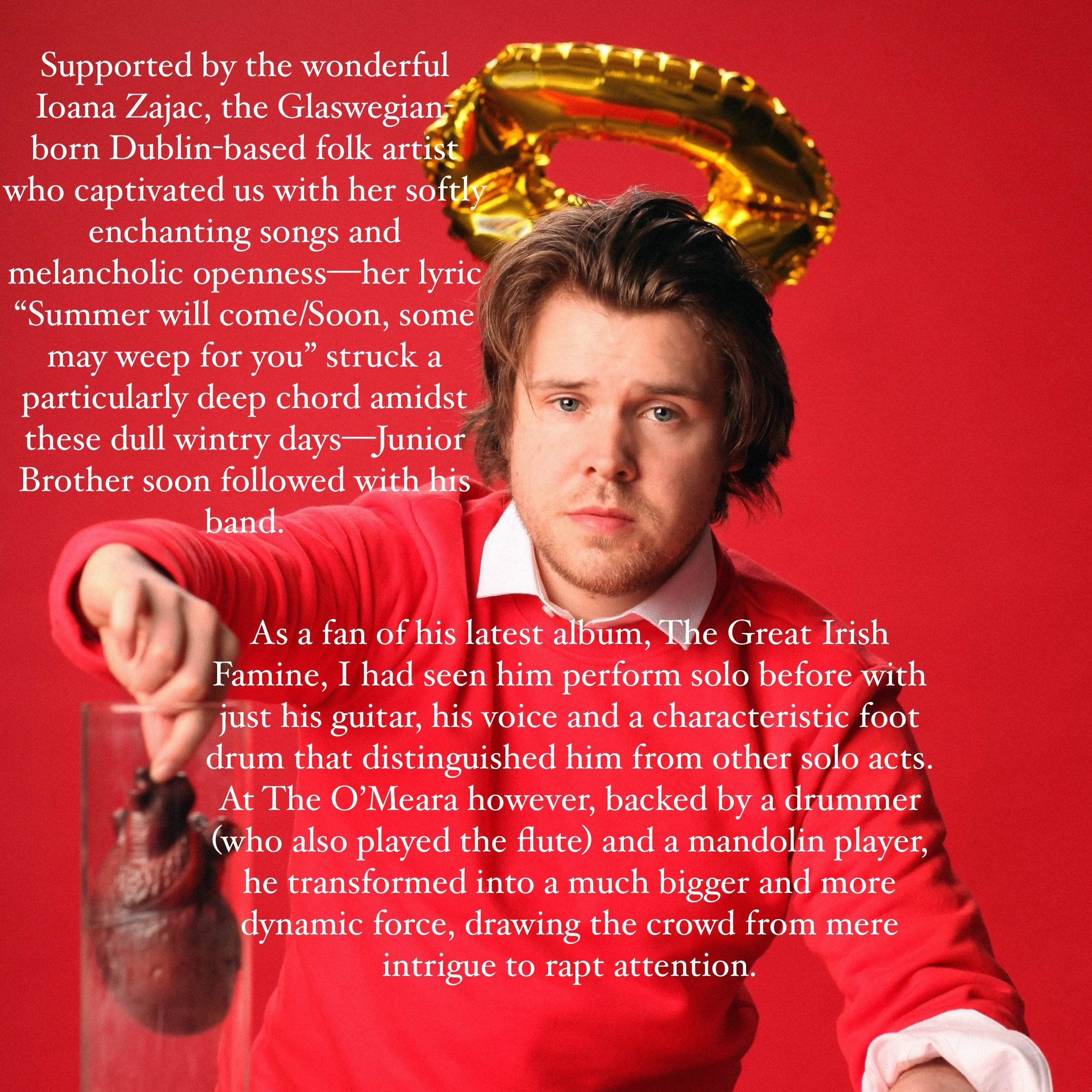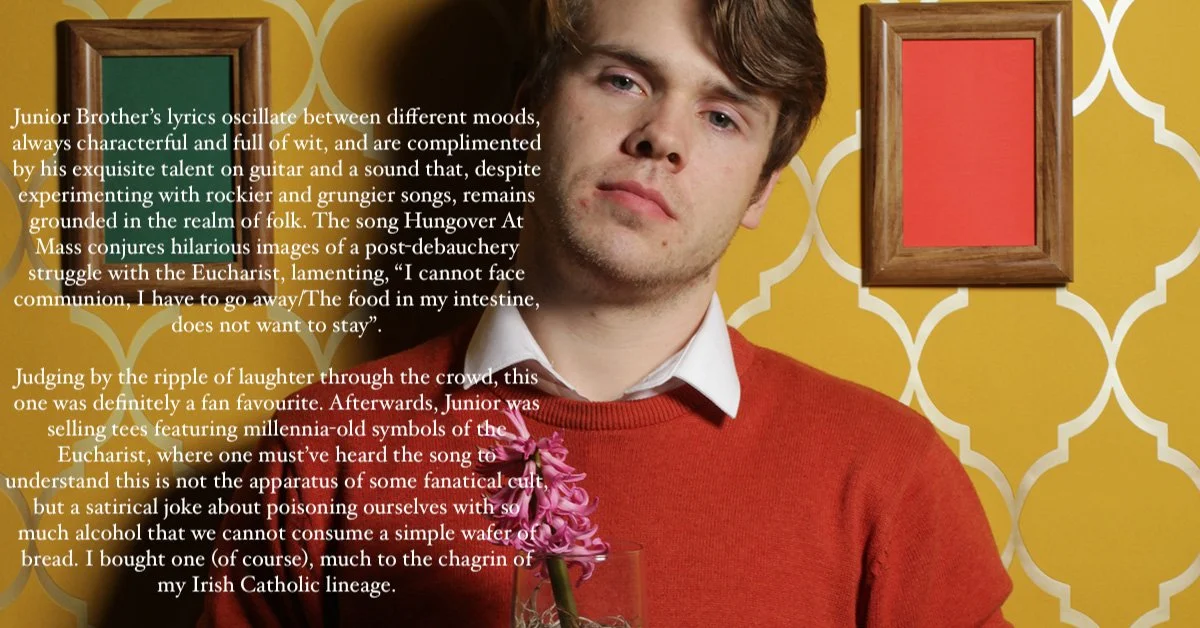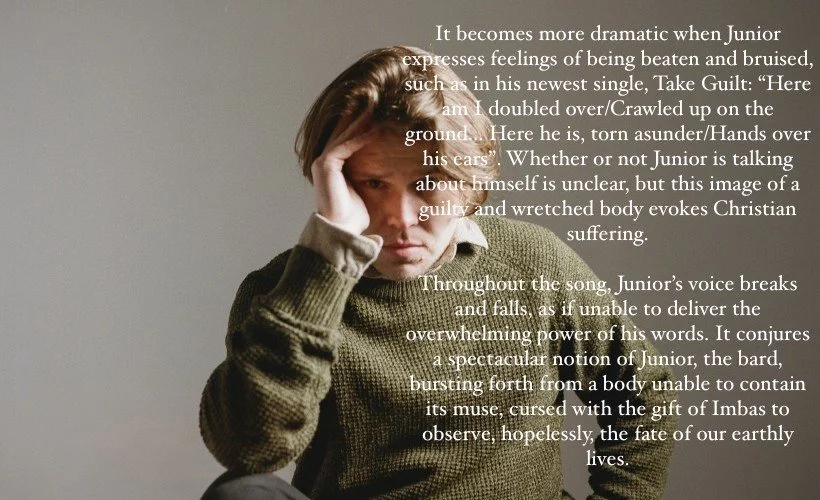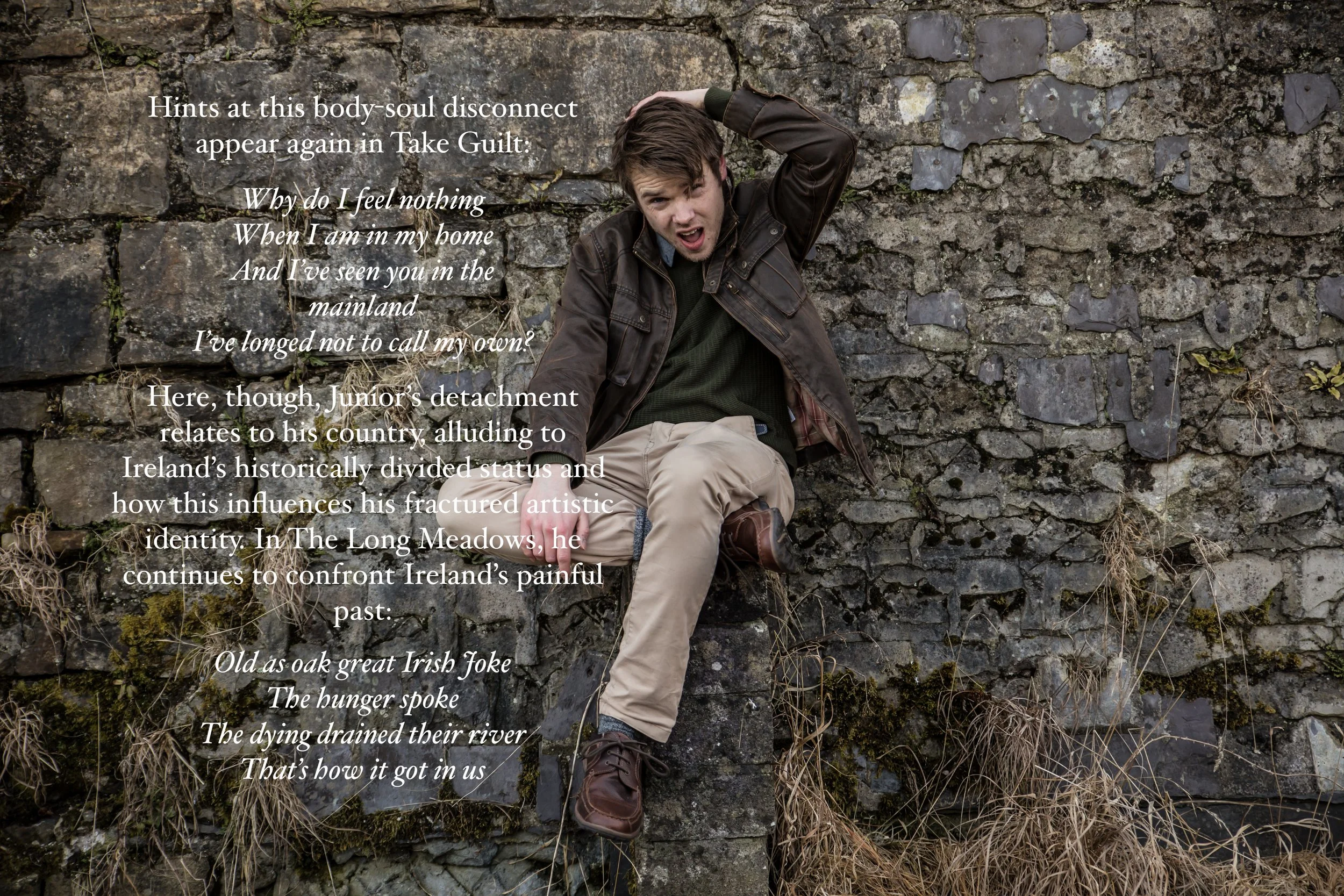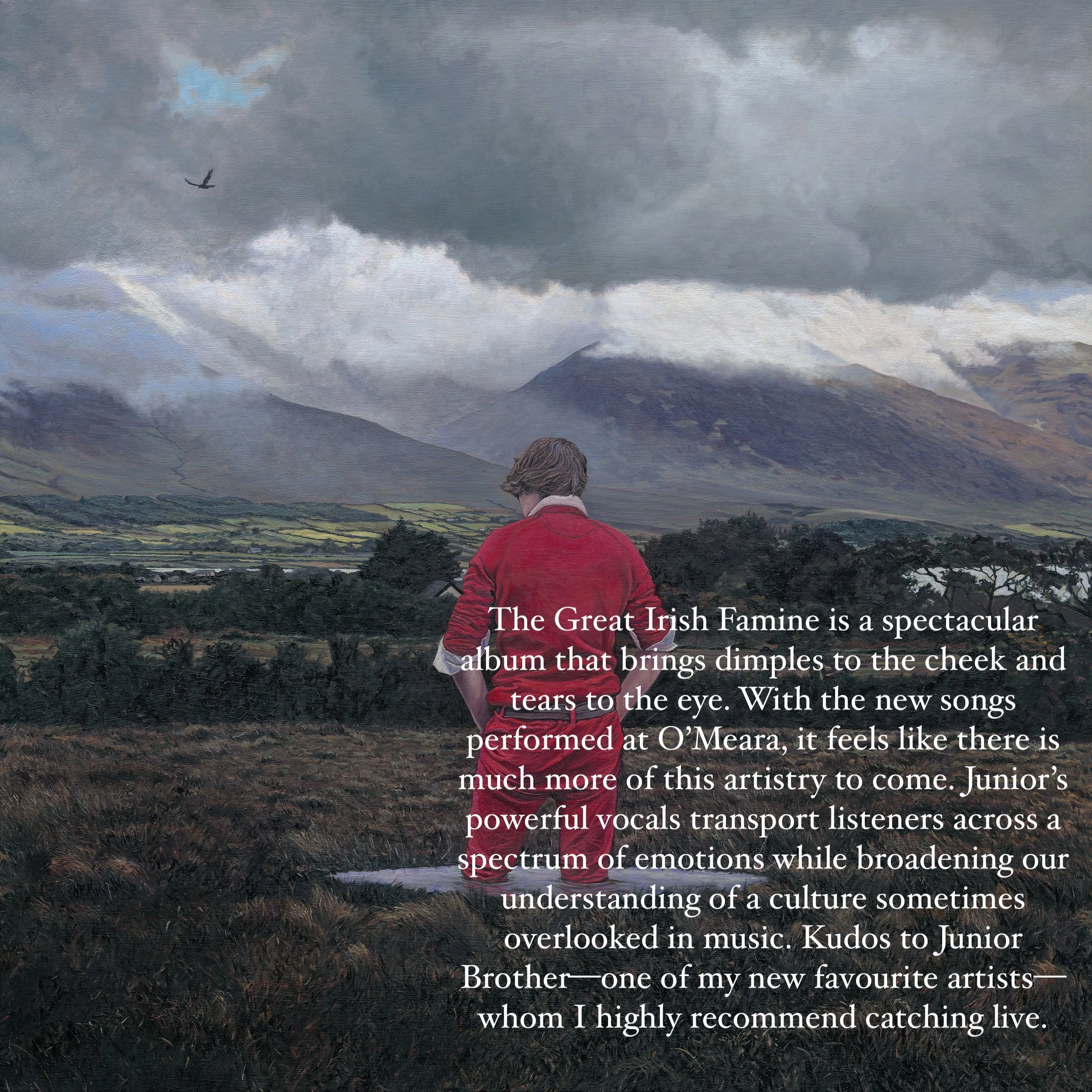October 24
Junior Brother: A modern bard of wit and heart
Conjuring wit and humour amidst a flurry of ballads, Junior Brother harks back to the roots of music in the modern world, much like a Celtic bard. He fills a void in today’s canon where artists like Billy Bragg and Joni Mitchell once stood, delivering unconventional compositions with personal lyrics that flit between the intimate and the universal, the national and the international, the minor and the monumental, all while charming the crowd with his unique take on Irish folk music.
I caught this fantastic poet during the London leg of his Ireland and UK tour at The O'Meara in Southwark. The venue, aptly named not only after its street but after the Gaelic ‘Ó Meadhra’ (meaning ‘a descendant of the mirthful one’), was filled with swathes of Irish voices cheering and laughing within its pillars. One can assume Junior Brother chose this venue intentionally for his show.
Supported by the wonderful Ioana Zajac, the Glaswegian-born Dublin-based folk artist who captivated us with her softly enchanting songs and melancholic openness — her lyric “Summer will come/Soon, some may weep for you” struck a particularly deep chord amidst these dull wintry days — Junior Brother soon followed with his band. As a fan of his latest album, The Great Irish Famine, I had seen him perform solo before with just his guitar, his voice and a characteristic foot drum that distinguished him from other solo acts. At The O’Meara however, backed by a drummer (who also played the flute) and a mandolin player, he transformed into a much bigger and more dynamic force, drawing the crowd from mere intrigue to rapt attention.
Junior Brother’s lyrics oscillate between different moods, always characterful and full of wit, and are complimented by his exquisite talent on guitar and a sound that, despite experimenting with rockier and grungier songs, remains grounded in the realm of folk. The song Hungover At Mass conjures hilarious images of a post-debauchery struggle with the Eucharist, lamenting, “I cannot face communion, I have to go away/The food in my intestine, does not want to stay”. Judging by the ripple of laughter through the crowd, this one was definitely a fan favourite. Afterwards, Junior was selling tees featuring millennia-old symbols of the Eucharist, where one must’ve heard the song to understand this is not the apparatus of some fanatical cult, but a satirical joke about poisoning ourselves with so much alcohol that we struggle to consume a simple wafer of bread. I bought one (of course), much to the chagrin of my Catholic lineage.
Similarly, in This Is My Body, Junior displays wry self-mockery for being unhealthy and letting himself go, asking, “Stripped from head to toe/How can she love a human potato?”. The audience erupted in laughter, yet also understood the vulnerability of our changing and ageing bodies that resonates with us all. This recurring theme of self-deprecation often contrasts with the beautifully joyous and climactic music, creating a poignant tension. It becomes more dramatic when Junior expresses feelings of being beaten and bruised, such as in his newest single, Take Guilt: “Here am I doubled over/Crawled up on the ground… Here he is, torn asunder/Hands over his ears”. Whether or not Junior is talking about himself is unclear, but this image of a guilty and wretched body evokes Christian suffering. Throughout the song, Junior’s voice breaks and falls, as if unable to deliver the overwhelming power of his words. It conjures a spectacular notion of Junior, the bard, bursting forth from a body unable to contain its muse, cursed with the gift of Imbas to observe, hopelessly, the fate of our earthly lives.
Hints at this body-soul disconnect appear again in Take Guilt:
Why do I feel nothing
When I am in my home
And I’ve seen you in the mainland
I’ve longed not to call my own?
Here, though, Junior’s detachment relates to his country, alluding to Ireland’s historically divided status and how this influences his fractured artistic identity. In The Long Meadows, he continues to confront Ireland’s painful past:
Old as oak great Irish Joke
The hunger spoke
The dying drained their river
That’s how it got in us
These words are roared by Junior amidst a discordant section of the music, introducing a cacophony of sounds and voices that feels like a flit between time and place, with Junior acting as the spiritual medium between ancient pain and present struggles. At O’Meara, Junior could transition from songs with this subject matter to others about jovial things like a dog groomer he knew in Crüe, Cork, and travel seamlessly between the two. It’s astonishing, really.
The Great Irish Famine is a spectacular album that brings dimples to the cheek and tears to the eye. With the new songs performed at O’Meara, it feels like there is much more of this artistry to come. Junior’s powerful vocals transport listeners across a spectrum of emotions while broadening our understanding of a culture sometimes overlooked in music. Kudos to Junior Brother — one of my new favourite artists — whom I highly recommend catching live.
